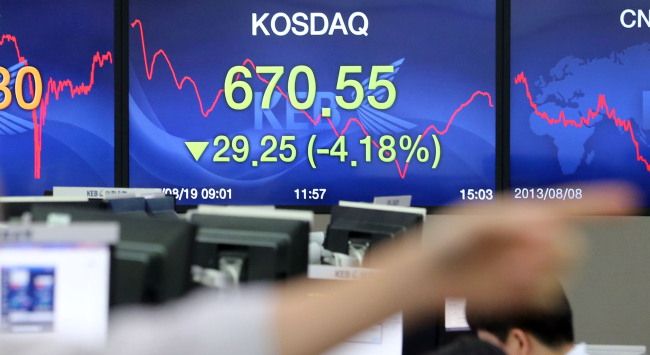KOSPI falls to 6-month low
Investors on alert for timing of U.S. rate hike
By 김연세Published : Aug. 19, 2015 - 15:27
South Korea’s benchmark stock index dipped below the 1,950 mark amid growing concerns that the U.S. Federal Reserve could raise interest rates as early as next month.
The KOSPI fell by 16.88 points, or 0.86 percent, to close at 1,939.38 on Wednesday. It recorded the lowest in about six months since it touched 1,935.86 on Feb. 10.
The plunge was attributable to speculation that foreign investors could massively pull out their investment in the coming weeks or months due to the weakening value of the Korean won against the U.S. dollar.

In addition, the crash of Chinese stocks is estimated to have dealt a blow to the Korean bourse, analysts said.
Foreign investors net sold local stocks for the 10th consecutive trading session, offloading 25.6 billion won ($21.6 million) of shares on the day. Their net selling came to 1.18 trillion won between Aug. 5 and Aug. 19.
While Korean small investors also net sold shares worth 186 billion won on Wednesday, institutional investors net purchased 167.4 billion won worth.
Local analysts say that the turning point would be Aug. 20, when the Federal Open Market Committee is scheduled to unveil the minutes for the July and August meetings.
“If the minutes, to be unveiled Thursday, hint at a timing delay in the rate hike, the massive selling streak could stop,” said an analyst at Daishin Securities. The timing of the rate hike has become more uncertain, but is expected to come between September and December.
The secondary KOSDAQ lost more -- down 4.18 percent to close at 670.55, marking the lowest level since it sank to 665.94 on May 6.
The U.S. dollar maintained its strong position versus the Korean currency to close at 1,185.3 won, up 0.3 won from a session earlier. The won-dollar rate surged over the past week, in particular, in the wake of China’s currency devaluation.
Deputy Prime Minister and Finance Minister Choi Kyung-hwan cautioned about worsening external conditions such as the critical slowdown of the Chinese economy, the coming U.S. rate hike and financial instability in emerging markets.
“The global financial market could see expanded volatility, and the environment for (Korea’s) exports is unfavorable,” Choi said during his report to the Special Committee on Budget & Accounts of the National Assembly.
Compared with other major economies, South Korea is in a low-growth phase.
During the second quarter, its GDP growth rate was lower than that of Spain and Portugal, both of which suffered financial woes in recent years.
While Korea posted a 0.3 percent growth in the second quarter, compared to the previous quarter, Spain and Portugal saw the quarter-to-quarter growth reach 1 percent and 0.4 percent, respectively.
Major Asian economies such as Hong Kong and Taiwan exceeded Korea in GDP growth with 0.4 percent and 1.5 percent, respectively, over the corresponding period. Indonesia and Malaysia too recorded higher growth rates of 3.7 percent and 2.6 percent.
By Kim Yon-se (kys@heraldcorp.com)



![[Herald Interview] 'Amid aging population, Korea to invite more young professionals from overseas'](http://res.heraldm.com/phpwas/restmb_idxmake.php?idx=644&simg=/content/image/2024/04/24/20240424050844_0.jpg&u=20240424200058)















